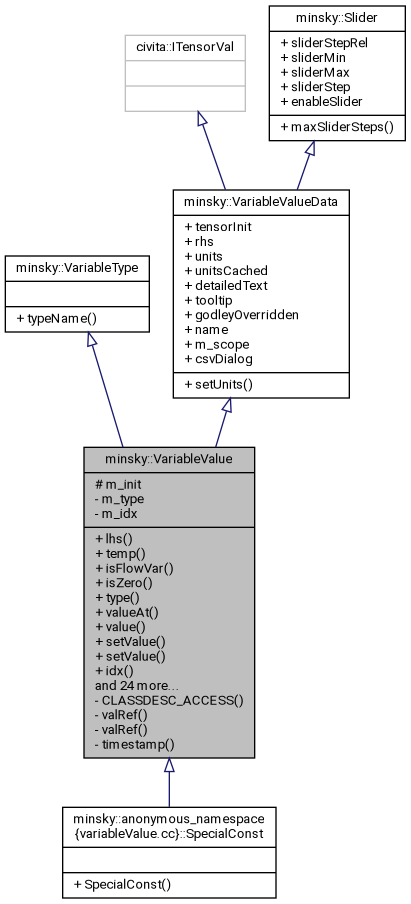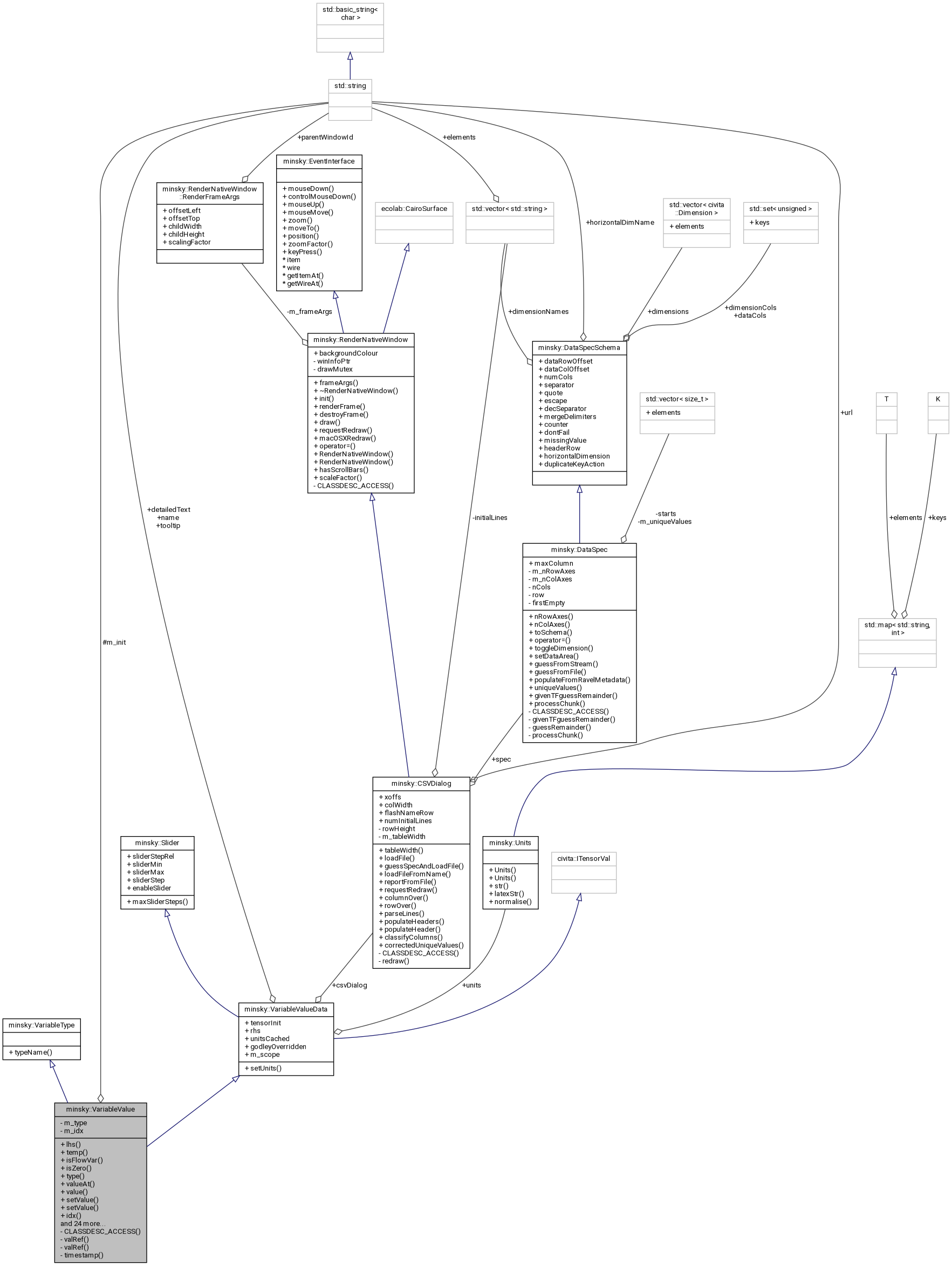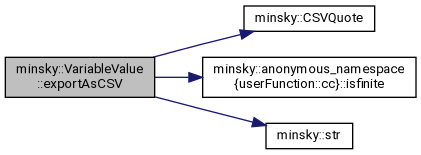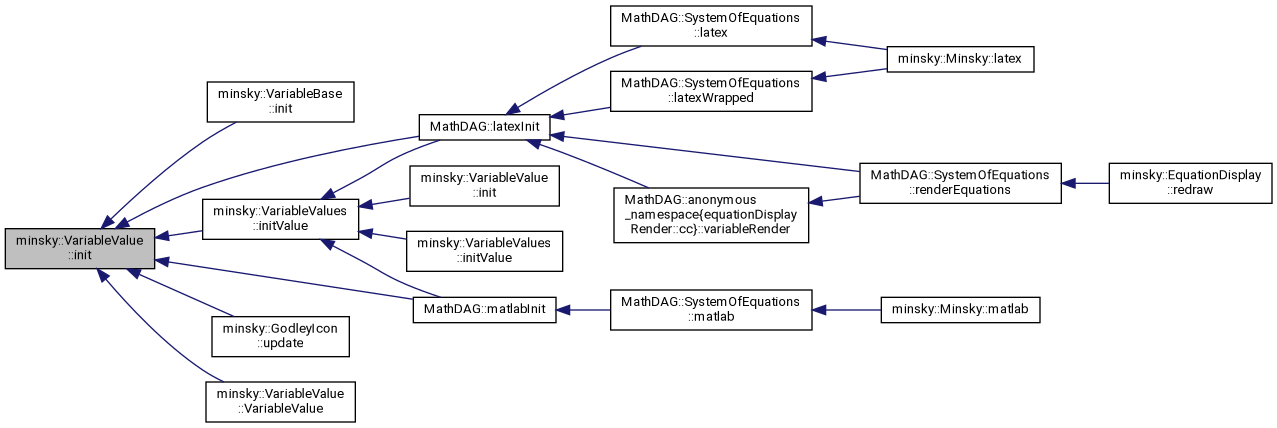#include <variableValue.h>


Public Member Functions | |
| bool | lhs () const |
| variable has an input port More... | |
| bool | temp () const |
| variable is a temporary More... | |
| bool | isFlowVar () const |
| returns true if variable's data is allocated on the flowVariables vector More... | |
| bool | isZero () const |
| VariableType::Type | type () const |
| value at the ith location of the vector/tensor. Default, (i=0) is right for scalar quantities More... | |
| double | valueAt (size_t i) const |
| double | value () const |
| set the value at the ith location More... | |
| double | setValue (size_t i, double x) |
| double | setValue (double x) |
| int | idx () const |
| void | reset_idx () |
| double | operator[] (std::size_t i) const override |
| double & | operator[] (std::size_t i) override |
| const Index & | index (Index &&i) override |
| template<class T > | |
| void | hypercube_ (T x) |
| bool | idxInRange () const |
| const Hypercube & | hypercube () const override |
| const Hypercube & | hypercube (const Hypercube &hc) override |
| const Hypercube & | hypercube (Hypercube &&hc) override |
| VariableValue (VariableType::Type type=VariableType::undefined, const std::string &name="", const GroupPtr &group=GroupPtr()) | |
| VariableValue (VariableType::Type type, const VariableValue &vv) | |
| VariableValue (const VariableValue &)=delete | |
| void | operator= (const VariableValue &)=delete |
| VariableValue & | operator= (TensorVal const &) |
| VariableValue & | operator= (const ITensor &x) override |
| VariableValue & | allocValue () |
| allocate space in the variable vector. More... | |
| std::string | valueId () const |
| void | exportAsCSV (const std::string &filename, const std::string &comment="", bool tabular=false) const |
| export this to a CSV file. If comment is non-empty, it is written as the first line of the file. If tabular is false, there is one data point per line, if true, the the longest dimension is written as a series on the line. More... | |
| Summary | summary () const |
| const std::string & | init () const |
| const std::string & | init (const std::string &x) |
| void | sliderSet (double x) |
| sets variable value (or init value) More... | |
| void | incrSlider (double step) |
| increment slider by step More... | |
| void | adjustSliderBounds () |
| adjust slider bounds to encompass the current value More... | |
 Public Member Functions inherited from minsky::VariableValueData Public Member Functions inherited from minsky::VariableValueData | |
| void | setUnits (const std::string &x) |
 Public Member Functions inherited from minsky::Slider Public Member Functions inherited from minsky::Slider | |
| double | maxSliderSteps () const |
| ensure there are at most 10000 steps between sliderMin and Max. see ticket 1255. More... | |
Protected Attributes | |
| std::string | m_init |
| the initial value of this variable More... | |
Private Member Functions | |
| CLASSDESC_ACCESS (VariableValue) | |
| double & | valRef () |
| index into value vector More... | |
| const double & | valRef () const |
| ITensor::Timestamp | timestamp () const override |
Private Attributes | |
| Type | m_type |
| int | m_idx =-1 |
Friends | |
| class | VariableManager |
| struct | SchemaHelper |
Additional Inherited Members | |
 Public Types inherited from minsky::VariableType Public Types inherited from minsky::VariableType | |
| enum | Type { undefined, constant, parameter, flow, integral, stock, tempFlow, numVarTypes } |
 Static Public Member Functions inherited from minsky::VariableType Static Public Member Functions inherited from minsky::VariableType | |
| static std::string | typeName (int t) |
 Public Attributes inherited from minsky::VariableValueData Public Attributes inherited from minsky::VariableValueData | |
| TensorVal | tensorInit |
| when init is a tensor of values, this overrides the init string More... | |
| TensorPtr | rhs |
| when the RHS is attached to a tensor expression, this is a reference to it More... | |
| Units | units |
| dimension units of this value More... | |
| bool | unitsCached =false |
| std::string | detailedText |
| long and short descriptions - common to all variables of a given name More... | |
| std::string | tooltip |
| bool | godleyOverridden =false |
| std::string | name |
| classdesc::Exclude< std::weak_ptr< Group > > | m_scope |
| CSVDialog | csvDialog |
| for importing CSV files More... | |
 Public Attributes inherited from minsky::Slider Public Attributes inherited from minsky::Slider | |
| bool | sliderStepRel =false |
| double | sliderMin =std::numeric_limits<double>::max() |
| double | sliderMax =-sliderMin |
| double | sliderStep =0 |
| bool | enableSlider =true |
Detailed Description
Definition at line 70 of file variableValue.h.
Constructor & Destructor Documentation
◆ VariableValue() [1/3]
|
inline |
Definition at line 156 of file variableValue.h.
References minsky::group, and minsky::scope().

◆ VariableValue() [2/3]
|
inline |
Definition at line 163 of file variableValue.h.
References init().

◆ VariableValue() [3/3]
|
delete |
Member Function Documentation
◆ adjustSliderBounds()
| void minsky::VariableValue::adjustSliderBounds | ( | ) |
adjust slider bounds to encompass the current value
Definition at line 237 of file variableValue.cc.
References minsky::anonymous_namespace{userFunction.cc}::isfinite(), and minsky::anonymous_namespace{userFunction.cc}::isnan().

◆ allocValue()
| VariableValue & minsky::VariableValue::allocValue | ( | ) |
allocate space in the variable vector.
- Returns
- reference to this
Definition at line 121 of file variableValue.cc.
Referenced by minsky::VariableValues::reset(), and minsky::VariableValues::resetValue().

◆ CLASSDESC_ACCESS()
|
private |
◆ exportAsCSV()
| void minsky::VariableValue::exportAsCSV | ( | const std::string & | filename, |
| const std::string & | comment = "", |
||
| bool | tabular = false |
||
| ) | const |
export this to a CSV file. If comment is non-empty, it is written as the first line of the file. If tabular is false, there is one data point per line, if true, the the longest dimension is written as a series on the line.
Definition at line 417 of file variableValue.cc.
References minsky::CSVQuote(), minsky::anonymous_namespace{userFunction.cc}::isfinite(), and minsky::str().
Referenced by minsky::Sheet::exportAsCSV(), and minsky::Ravel::exportAsCSV().


◆ hypercube() [1/3]
|
override |
Definition at line 213 of file variableValue.cc.
References minsky::cminsky(), minsky::Minsky::definingVar(), and minsky::valueId().
Referenced by minsky::Ravel::exportAsCSV(), minsky::loadValueFromCSVFileT(), and minsky::Minsky::populateMissingDimensionsFromVariable().


◆ hypercube() [2/3]
|
inlineoverride |
Definition at line 150 of file variableValue.h.
◆ hypercube() [3/3]
|
inlineoverride |
Definition at line 152 of file variableValue.h.
◆ hypercube_()
|
inline |
Definition at line 138 of file variableValue.h.
◆ idx()
|
inline |
Definition at line 121 of file variableValue.h.
Referenced by minsky::EvalOpPtr::EvalOpPtr(), and minsky::VariableValues::resetValue().

◆ idxInRange()
| bool minsky::VariableValue::idxInRange | ( | ) | const |
Definition at line 89 of file variableValue.cc.
Referenced by minsky::VariableValues::reset(), and minsky::VariableValues::resetValue().

◆ incrSlider()
| void minsky::VariableValue::incrSlider | ( | double | step | ) |
increment slider by step
Definition at line 232 of file variableValue.cc.
◆ index()
|
inlineoverride |
Definition at line 127 of file variableValue.h.
Referenced by minsky::loadValueFromCSVFileT().

◆ init() [1/2]
|
inline |
Definition at line 185 of file variableValue.h.
Referenced by minsky::VariableBase::init(), minsky::VariableValues::initValue(), MathDAG::latexInit(), MathDAG::matlabInit(), minsky::GodleyIcon::update(), and VariableValue().

◆ init() [2/2]
| const std::string & minsky::VariableValue::init | ( | const std::string & | x | ) |
Definition at line 201 of file variableValue.cc.
References minsky::cminsky(), minsky::Minsky::definingVar(), minsky::VariableValues::initValue(), minsky::valueId(), and minsky::Minsky::variableValues.

◆ isFlowVar()
|
inline |
returns true if variable's data is allocated on the flowVariables vector
Definition at line 96 of file variableValue.h.
Referenced by minsky::EvalOpPtr::EvalOpPtr(), and minsky::VariableValues::resetValue().

◆ isZero()
|
inline |
Definition at line 99 of file variableValue.h.
◆ lhs()
|
inline |
variable has an input port
Definition at line 90 of file variableValue.h.
◆ operator=() [1/3]
|
delete |
◆ operator=() [2/3]
| VariableValue& minsky::VariableValue::operator= | ( | TensorVal const & | ) |
◆ operator=() [3/3]
|
override |
Definition at line 111 of file variableValue.cc.
References civita::ITensor::hypercube(), civita::ITensor::index(), and civita::ITensor::size().

◆ operator[]() [1/2]
|
inlineoverride |
Definition at line 124 of file variableValue.h.
◆ operator[]() [2/2]
|
override |
◆ reset_idx()
|
inline |
Definition at line 122 of file variableValue.h.
Referenced by minsky::VariableValues::reset().

◆ setValue() [1/2]
|
inline |
Definition at line 115 of file variableValue.h.
◆ setValue() [2/2]
|
inline |
Definition at line 120 of file variableValue.h.
References setValue().
Referenced by setValue().


◆ sliderSet()
| void minsky::VariableValue::sliderSet | ( | double | x | ) |
sets variable value (or init value)
Definition at line 222 of file variableValue.cc.
References minsky::anonymous_namespace{userFunction.cc}::isfinite().

◆ summary()
| Summary minsky::VariableValue::summary | ( | ) | const |
Definition at line 514 of file variableValue.cc.
References minsky::cminsky(), MathDAG::SystemOfEquations::getNodeFromIntVar(), MathDAG::SystemOfEquations::getNodeFromValueId(), minsky::Minsky::model, minsky::scope(), minsky::valueId(), and minsky::var.

◆ temp()
|
inline |
variable is a temporary
Definition at line 93 of file variableValue.h.
◆ timestamp()
|
inlineoverrideprivate |
Definition at line 83 of file variableValue.h.
◆ type()
|
inline |
value at the ith location of the vector/tensor. Default, (i=0) is right for scalar quantities
Definition at line 103 of file variableValue.h.
◆ valRef() [1/2]
|
private |
index into value vector
Definition at line 177 of file variableValue.cc.
◆ valRef() [2/2]
|
private |
Definition at line 153 of file variableValue.cc.
◆ value()
|
inline |
set the value at the ith location
Definition at line 113 of file variableValue.h.
◆ valueAt()
|
inline |
Definition at line 108 of file variableValue.h.
◆ valueId()
|
inline |
Definition at line 178 of file variableValue.h.
References minsky::canonicalName(), and minsky::valueIdFromScope().
Referenced by minsky::VariableValues::resetValue().


Friends And Related Function Documentation
◆ SchemaHelper
|
friend |
Definition at line 80 of file variableValue.h.
◆ VariableManager
|
friend |
Definition at line 79 of file variableValue.h.
Member Data Documentation
◆ m_idx
|
private |
Definition at line 75 of file variableValue.h.
◆ m_init
|
protected |
the initial value of this variable
Definition at line 87 of file variableValue.h.
◆ m_type
|
private |
Definition at line 74 of file variableValue.h.
The documentation for this class was generated from the following files:
- engine/variableValue.h
- engine/variableValue.cc
